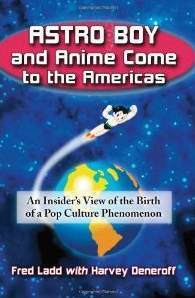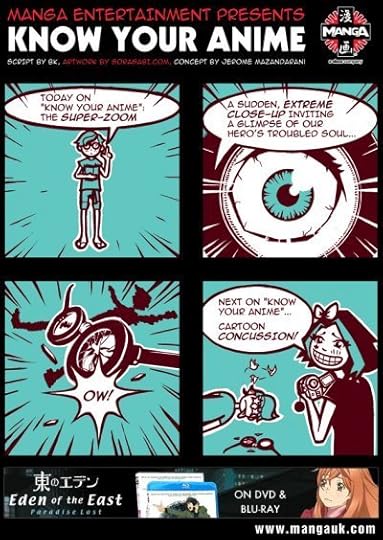Jonathan Clements's Blog, page 13
January 29, 2012
Indian Giving
Mark Schilling's latest article in Variety discusses some of the issues facing modern anime, including the ever-growing rush to outsource, plummeting demographics and hybrid contents. Yours truly is briefly quoted with a very conservative estimate of the size of the foreign labour pool — Ryosuke Takahashi puts it a lot higher. Schilling suggests that declining numbers of children are responsible for declining numbers of anime, but I do not entirely agree with this, or at least, not with the way that the data is presented here. The peak of production in 2006 was generated by an insanely high investment interest from abroad, which is still playing out today as all the investors sue each other over what went wrong.
January 27, 2012
Pen Names

When I handed in my manuscript of Spartacus: Swords & Ashes, I decided to call myself J.M. Clements. I thought it would be a smart move to stop Amazon spamming everybody who'd bought one of my non-fiction books and expecting them to like my fiction, too. I mean, they might. But I figured Spartacus is for Spartacus fans, and my name on the cover shouldn't influence them one way or the other.
"It's pretty obvious who you are," sniffed the Editrix. "It's about as likely to fool the public as Iain 'M' Banks."
"I know," I said. "And I'm proud of the book. I'm just trying to keep fact and fiction in separate areas. I hate it when some douche on Library Thing decides I shouldn't be allowed to write about one subject because he thinks I can only write about something else."
"That's stupid," said the Editrix. "That never happens."
"It always happens!" I protested. "And they've got a particular hard-on for people who switch between fact and fiction, which people often do if they write for a living. I dread to imagine what these one-track people are like in real life, as if they don't think it's possible to be a father and an insurance salesman, or a Saturday footballer and a chef. They probably have conniptions if they have to do two things at once. Then they review themselves and say: 'I cannot possibly walk and chew gum, for those activities are mutually exclusive. Worst gum-chewing walk evarrr.'"
"You are over-reacting," said the Editrix.
"If they ran the world," I ranted, "they'd say Neil Gaiman could only write about Duran Duran. Lynda la Plante would be good for nothing but Rentaghost. Robert Silverberg could only write popular history. And Tolkien can piss right off and stick to Anglo-Saxon etymology."
"All right," sighed the Editrix. "Have it your way."
The next day, the Editrix was back.
"The distributors want to know about the other things you've written," she said. "It's so they can tell booksellers how brilliant you are."
"But won't that make it really obvious who I am?" I said.
"Yes, probably," she said, without pause or apology.
 So I told her about The Destroyer of Delights, which was a Doctor Who audio I was very pleased with, which had a recurring subtext about the nature of slavery. And since there were lots of fights in it, I thought that my Highlander story Secret of the Sword, was probably worth a mention. I decided it probably wasn't worth bringing up the biography I once wrote of the president of Finland. He doesn't crop up much in Spartacus.
So I told her about The Destroyer of Delights, which was a Doctor Who audio I was very pleased with, which had a recurring subtext about the nature of slavery. And since there were lots of fights in it, I thought that my Highlander story Secret of the Sword, was probably worth a mention. I decided it probably wasn't worth bringing up the biography I once wrote of the president of Finland. He doesn't crop up much in Spartacus.
A day later, the Editrix was back again.
"The distributors want to know where you live," she said.
"Jupiter's cock! Why!?"
"They like it. Their sales people like being able to say, 'he's a local boy', to a bookseller near you."
"But isn't it more productive if everybody thinks I am a local boy?"
"Do not question the House of Random!"
"All right, all right." So I told her where I lived. It felt a little bit like I was handing over my bank details to a Nigerian prince.
All of which meant was that by the time Spartacus: Swords & Ashes was up on Amazon, some bright spark had already worked out precisely who I was, and it was listed with all my other books. My attempt to carefully separate my fact and fiction had failed again.
 "I've got a translation of The Art of War coming out in the summer," I protested. "But shelvers at book-stores are going to look me up online and order their copies on the basis of the sales of this novel, which is full of sword-fights, swearing, rape and adverbs. It will be the most heavily over-ordered classical text in living memory."
"I've got a translation of The Art of War coming out in the summer," I protested. "But shelvers at book-stores are going to look me up online and order their copies on the basis of the sales of this novel, which is full of sword-fights, swearing, rape and adverbs. It will be the most heavily over-ordered classical text in living memory."
"You say that," said the Editrix, "like it's a bad thing."
J.M. Clements is the author of Spartacus: Swords & Ashes, available now in paperback and on Kindle. He has written a few other things, too.
January 24, 2012
Fill Them All
I'm a guest blogger this week over at Starburst, discussing Roman law, the history of slavery and allegories of zombie outbreak in the Roman Republic. There's also a chance to win a copy of my Spartacus novel.
And that's not all, for there's another guest blog from me over at A Temporary Distraction, this time analysing my love of the earthy language of Spartacus – probably the only time you'll see someone discussing Derek Jarman, gladiators' groupies and the use of the indefinite article all in on the same page. If you've ever wanted to know about how to insult someone's mother in Latin, now's your chance.
ARE YOU NOT ENTERTAINED? If that's not enough, I appear yet again over at Blogomatic 3000, this time discussing the pitfalls of writing something that has to displease all readers equally. How obscene is too obscene, in a world where people get their faces hacked off? I hasten to clarify, when I say in this piece "crushed and broken by empire", I'm using "empire" in its post-colonial studies sense as a "decentred and deterritorialising apparatus". Spartacus lived at the time of the Roman Republic, of course, but the empire was already on its way.
January 20, 2012
The Votoms Line
 There's a short piece on director Ryosuke Takahashi up now on the Manga UK blog, drawn from our many conversations at last year's Scotland Loves Anime. Takahashi was the unquestionable star of the festival, and a great raconteur, with stories about scrubbing gold paint off naked actresses, robots on rollerskates, and his early days as a dogsbody at Osamu Tezuka's Mushi Production.
There's a short piece on director Ryosuke Takahashi up now on the Manga UK blog, drawn from our many conversations at last year's Scotland Loves Anime. Takahashi was the unquestionable star of the festival, and a great raconteur, with stories about scrubbing gold paint off naked actresses, robots on rollerskates, and his early days as a dogsbody at Osamu Tezuka's Mushi Production.
His quote of the week was delivered to the audience as they took their seats for the Armoured Trooper Votoms: Pailsen Files movie.
"Pailsen Files and golf have a lot in common," he said, with a mischievous twinkle in his eye. "Both are the inheritors of long traditions. And both are quite boring to watch!"
January 13, 2012
January 5, 2012
The Verrine Orations
 Gaius Verres was an asshole. He persecuted the Roman citizens that he was supposed to be ruling. He exploited a disaster on the mainland in order to line his own coffers, by accusing locals of harbouring escaped slaves. A man who stood up to him was so badly beaten that he died from his injuries. Another was crucified in sight of the mainland, taunting him with the knowledge that he almost, but not quite out of the jurisdiction of the man who'd had him killed.
Gaius Verres was an asshole. He persecuted the Roman citizens that he was supposed to be ruling. He exploited a disaster on the mainland in order to line his own coffers, by accusing locals of harbouring escaped slaves. A man who stood up to him was so badly beaten that he died from his injuries. Another was crucified in sight of the mainland, taunting him with the knowledge that he almost, but not quite out of the jurisdiction of the man who'd had him killed.
The people of Sicily got their revenge in the end, when they hired the young, up-and-coming litigator Cicero to plead their corruption case against their former governor. Cicero went for Verres like a man possessed. We know this because we still have the transcripts of his court-room arguments: a scathing, sarcastic series of personal attacks published as the Verrine Orations. Cicero never got to deliver them all because Verres, realising that bribes wouldn't save him, fled the country, but Cicero was so keen on taking him down that he published the rest of his notes anyway.
The accusations from the Verrine Orations read like a…. well, like a proposal for a tie-in novel for Spartacus: Vengeance. As Spartacus terrorises the mainland, Verres uses his own position as governor of Sicily to exploit the disaster. He accuses locals of harbouring escaped slaves, and confiscates their property on trumped-up charges. He puts an incompetent crony in charge of his anti-pirate fleet, so that he can steal the man's wife. The newly appointed admiral is so useless that the pirates actually attack Syracuse harbour.
My novel Spartacus: Swords & Ashes had to take place during the first season of the TV series, just before Verres took office in Sicily. But the temptation was irresistible to treat it as a prelude to the Verrine Orations. Why would Cicero be so keen to take Verres down after the Spartacus War? Could it be that they had met before, in a story unmentioned in the history books?
One of the stand-out characters in the Verrine Orations is Timarchides, a freed slave who works as Verres' hatchet-man, intimidating witnesses, beating up rivals, and purloining government property for parties and orgies. For a story like that of Spartacus, obsessed with the state of slavery and what it means for human beings, what kind of man would Timarchides have been? How would he feel about having won his freedom, and what sort of attitude would he have to those who were still slaves?
So I put all three of them into Swords & Ashes. Gaius Verres, the newly-appointed governor of Sicily, ready to frisk the province for all it's got. Timarchides his right-hand man, a former gladiator who despises slaves. And Cicero, the good-hearted young investigator, who comes to Neapolis on senatorial business. All are thrown into new intrigues at the funeral games of a noted local lanista, whose Capuan colleague Batiatus is providing the gladiators… including his celebrity warrior, Spartacus.
What could possibly go wrong…?
J.M. Clements is the author of Spartacus: Swords & Ashes, out now in the US in paperback and on the Kindle. It is released in the UK on 27th January.
January 4, 2012
The Final Encyclopaedia
David Langford has kindly sorted out a list of all the entries I have written so far for the Encyclopedia of Science Fiction. Which is nice. I think I still have a good 100 or so to do before the Japan section starts to look ship-shape, and the same again for China.
2009: Lost Memories
Arai Motoko
Asakura Hisashi
Bi'en Fū
Bok Geo-Il
Bolaño, Roberto
Bubble E Go! Time Machine Wa Drum-Shiki
Clements, Jonathan
Edogawa Ranpo
Friedman, George
Fukuda Tsuneari
Furuhashi Hideyuki
Ginga Uchū Odyssey
Goong
Grey
Guo Xiaolu
Hanmura Ryō
Hirose Tadashi
Hoshino Yukinobu
Ikeda Noriaki
Inoue Hisashi
Ishihara Fujio
Ishinomori Shōtarō
Itō Keikaku
Itō Norio
Jinka Katsuo
Kamishibai
Kanbayashi Chōhei
Kanbe Musashi
Katō Naoyuki
Kawamata Chiaki
Kaze No Tani No Nausicaä
Kimi to Ita Mirai No Tame Ni
Kiodomari Allan
Kobayashi Yasumi
Komatsuzaki Shigeru
Kon Satoshi
Koyama Takao
Kuroma Hisashi
Maeda Kensetsu
Mama Wa Shōgaku Yon-Nensei
Masaki Gorō
Matsumoto Leiji
Matsuo Yumi
Mayumura Taku
Memories
Michihara Katsumi
Mishima Yukio
Mizutama Keinojō
Mori Hiroshi
Morioka Hiroyuki
Nagaoka Shūsei
Nakamura Tōru
Nippon Chinbotsu
Nojiri Hōsuke
Numa Shōzō
Ō-Atari Sora No Entaku
Ogawa Issui
Ōrai Noriyoshi
Oshikawa Shunrō
Ōtomo Katsuhiro
Palahniuk, Chuck
Rao Zhonghua
Rōjin Z
Sakurazaka Hiroshi
Satō Haruo
Satō Michiaki
Seiun Award
Shinkai Makoto
Sky Crawlers
Spriggan
Steamboy
Suemi Jun
Suga Hiroe
Suzuki Izumi
Takachiho Haruka
Takami Kōshun
Tanigawa Nagaru
Toki o Kakeru Shōjo
Tomino Yoshiyuki
Tonari No Totoro
Top o Nerae
Tsutsui Yasutaka
Ubukata Tow
Unno Jūza
Urasawa Naoki
Wang Lixiong
Wasei King Kong
Wei Yahua
Yamada Masaki
Yamazaki Haruya
Yano Tetsu
Yokoyama Eiji
Yoneda Hitoshi
Yoshihara Rieko
Yoshioka Hitoshi
Yukimura Makoto
Joint credits
Flowers for Algernon
Komatsu Sakyō
Mecha
Murakami Haruki
Sherlock Holmes
Shibano Takumi
December 30, 2011
2011: The Year in Anime Books
For the last few years, it has been my mission to read through as many Japanese books about anime as possible, with special concentration on personal testimonies from the animators themselves. And I have been annotating as I go. For some reason, many of the people who write books about anime are allergic to indices, so I have been writing my own, of dozens upon dozens of memoirs and biographies, in order to build up a picture of the way the anime business looks to the people who actually work in it. The concordance is currently at 230 typed pages, although I think it will hit 300 before I am done. The work has functioned as a sort of audit of what people think they know about the business they work in, and has allowed me to chart several memes and misconceptions from their birth through to their establishment as industry lore.
 And so my neck-deep wade through Japanese-language books on anime has continued, most recently with the NTT collection of scholarly essays Anime in Transition (or Anime Across Borders? or Anime Transnational?). The book is something of a landmark, forming an entire volume of the eight-part Japanese Film is Alive series from Iwanami Shoten, and hence perhaps redeeming anime as just as reasonable a field of study as, say, documentary, performance or audience. Notably, however, five of the eleven chapters in the book are written by foreign authors, with the likes of Marc Steinberg, Thomas Lamarre and Hu Tze-yue providing commentary and perspectives that the Japanese seem unwilling or unable to provide themselves. Is Japanese academia on animation really that lacking in local heroes, or is this a form of auto-orientalism, with the Japanese lapping up foreign attention as a means of validating their own interests in such an unlikely, unloved field as animation studies?
And so my neck-deep wade through Japanese-language books on anime has continued, most recently with the NTT collection of scholarly essays Anime in Transition (or Anime Across Borders? or Anime Transnational?). The book is something of a landmark, forming an entire volume of the eight-part Japanese Film is Alive series from Iwanami Shoten, and hence perhaps redeeming anime as just as reasonable a field of study as, say, documentary, performance or audience. Notably, however, five of the eleven chapters in the book are written by foreign authors, with the likes of Marc Steinberg, Thomas Lamarre and Hu Tze-yue providing commentary and perspectives that the Japanese seem unwilling or unable to provide themselves. Is Japanese academia on animation really that lacking in local heroes, or is this a form of auto-orientalism, with the Japanese lapping up foreign attention as a means of validating their own interests in such an unlikely, unloved field as animation studies?
 I'd believe it if NTT Shuppan had not answered within the year with an all-Japanese collection. There is no question about the anime book of the year 2011 — that award surely goes to Anime Studies, edited by Mitsuteru Takahashi and the omnipresent Nobuyuki Tsugata. Anime Studies contains ten chapters of detailed commentary on many interesting areas in the anime field, including education, intellectual property and national animation policy. The authors include academics, but also producers and directors, most notably with a chunky section from Ryosuke Takahashi about Tezuka's anime "revolution". Anime Studies is the book to which I wish every Western scholar had access, laden with charts and diagrams explaining the way that modern anime works, but also with informed references to peripheral areas, and, that greatest rarity in books on anime, a functional index.
I'd believe it if NTT Shuppan had not answered within the year with an all-Japanese collection. There is no question about the anime book of the year 2011 — that award surely goes to Anime Studies, edited by Mitsuteru Takahashi and the omnipresent Nobuyuki Tsugata. Anime Studies contains ten chapters of detailed commentary on many interesting areas in the anime field, including education, intellectual property and national animation policy. The authors include academics, but also producers and directors, most notably with a chunky section from Ryosuke Takahashi about Tezuka's anime "revolution". Anime Studies is the book to which I wish every Western scholar had access, laden with charts and diagrams explaining the way that modern anime works, but also with informed references to peripheral areas, and, that greatest rarity in books on anime, a functional index.
 Anime directors continued to be feted with studies and analysis, notably in books about Kenji Kamiyama and the journeyman director Keiichi Hara, now enjoying a new-found fame thanks to his feature debut on Colorful. This has also been a good year for books that analyse anime from the perspective of a producer or manager. Six years after he penned a guide to the anime business, Hiromichi Yasuda writes an all-new account of the same subject, incorporating the wild ride of changes since the 2006 production peak. Meanwhile, Kinema Junpo jumps on the bandwagon with books on the below-the-line squabbles that get anime made in the first place including How to Make a Hit "Mundane" Anime and On the Job of the Anime Producer. Meanwhile, Yuichiro Oguro publishes the long-awaited second volume of his Anime Creator Interviews, collating material originally run in Animage at the beginning of the last decade.
Anime directors continued to be feted with studies and analysis, notably in books about Kenji Kamiyama and the journeyman director Keiichi Hara, now enjoying a new-found fame thanks to his feature debut on Colorful. This has also been a good year for books that analyse anime from the perspective of a producer or manager. Six years after he penned a guide to the anime business, Hiromichi Yasuda writes an all-new account of the same subject, incorporating the wild ride of changes since the 2006 production peak. Meanwhile, Kinema Junpo jumps on the bandwagon with books on the below-the-line squabbles that get anime made in the first place including How to Make a Hit "Mundane" Anime and On the Job of the Anime Producer. Meanwhile, Yuichiro Oguro publishes the long-awaited second volume of his Anime Creator Interviews, collating material originally run in Animage at the beginning of the last decade.
 You'll notice, perhaps, that many of the books have dully typographical covers. In a country where Japanese studios will often charge magazines even for illustrations used to accompany rave reviews, the studios are often their own worst enemies when it comes to picture sourcing. I am pleased to note that the current crop of Japanese academics and scholars have simply given up playing the studios' game, and instead published the texts that they want to publish, without bending over for outrageous fees or assenting to textual tampering — here's a hello to the idiot who tried to get us to lie about the production details of his company's movie in the Anime Encyclopedia, and who tried to use image access as the lure to make us cooperate. Anime is, assuredly, a visual medium, but I would much rather have good books published without pictures than see compromised picture-books, defanged of all their interesting content.
You'll notice, perhaps, that many of the books have dully typographical covers. In a country where Japanese studios will often charge magazines even for illustrations used to accompany rave reviews, the studios are often their own worst enemies when it comes to picture sourcing. I am pleased to note that the current crop of Japanese academics and scholars have simply given up playing the studios' game, and instead published the texts that they want to publish, without bending over for outrageous fees or assenting to textual tampering — here's a hello to the idiot who tried to get us to lie about the production details of his company's movie in the Anime Encyclopedia, and who tried to use image access as the lure to make us cooperate. Anime is, assuredly, a visual medium, but I would much rather have good books published without pictures than see compromised picture-books, defanged of all their interesting content.
 There is still a good deal of pretension awash in the anime field. Ani Kuri 15 DVD x Material is an infuriatingly packaged book of interviews and storyboards from the short series of NHK commercials made to order by creatives including the late Satoshi Kon, as well as Yasufumi Soejima and Shinji Kimura. Which is all very well, but it comes with a tight yet flimsy paper wraparound that is sure to tear after a single use, and includes an origami robot by way of apology.
There is still a good deal of pretension awash in the anime field. Ani Kuri 15 DVD x Material is an infuriatingly packaged book of interviews and storyboards from the short series of NHK commercials made to order by creatives including the late Satoshi Kon, as well as Yasufumi Soejima and Shinji Kimura. Which is all very well, but it comes with a tight yet flimsy paper wraparound that is sure to tear after a single use, and includes an origami robot by way of apology.
Other books I've read this year have included Yuka Minakawa's two-volume account of the "rise and fall" of Tezuka's Mushi Production, although the fall is bundled into the final few pages. Like Eiichi Yamamoto's much-cited 1989 Rise & Fall of Mushi Pro, the book is presented in fictionalised form, although Minakawa presents detailed references, usually to DVD sleeve-note interviews and other ephemera that might elude the more traditional scholar. I also found much of interest in Makoto Misono's 1999 Complete Book of TV Animation, a forerunner of the Anime Studies collection that diligently attempted to create an institutional memory for television cartoons more than a decade ago. I think I bought it when working on the first edition of the Anime Encyclopedia, but I haven't properly gone through it till now. I also stumbled across Masaki Tsuji's long out-of-print The Youth of TV Anime, a memoir of the 1960s and 1970s by the scriptwriter of, among other things, Astro Boy, Star of the Giants and Sazae-san. It's the last that interests me in particular, since the studio that made Sazae-san has never really had to try since. Go on: see if you can name it without opening a book or another window. It's not all that famous, despite making Japan's highest-rated and longest-running cartoon. Whereas other studios have to push and flash and bluster to get attention, the studio that makes Sazae-san just motors along on a job that is essentially below-the-line… certainly below the notice of many foreign fans.
 In this periodic round-up, which I have previously run in 2010 and 2009, it's usually my habit to talk about the English-language books on anime that come my way. In many cases this year, I have already reviewed them elsewhere, such as this piece on the excellent Ladd and Deneroff memoir of early anime in America. I've also written a glowing review of Iwao Takamoto's autobiography, but that won't appear until later in 2012. In others, I simply haven't got round to them, since the Japanese-language books are prioritised ahead of them. In a couple of others, I have read them, although they were so awful that I cannot bring myself to even name them. One was an academic account so up itself as to be entirely impenetrable, including an interview with a Japanese creator who actually tells the author to piss off and talk to someone else. The other was a seemingly self-published witter about divinity in anime, by a man who couldn't even spell Wikipedia, even as he cited it.
In this periodic round-up, which I have previously run in 2010 and 2009, it's usually my habit to talk about the English-language books on anime that come my way. In many cases this year, I have already reviewed them elsewhere, such as this piece on the excellent Ladd and Deneroff memoir of early anime in America. I've also written a glowing review of Iwao Takamoto's autobiography, but that won't appear until later in 2012. In others, I simply haven't got round to them, since the Japanese-language books are prioritised ahead of them. In a couple of others, I have read them, although they were so awful that I cannot bring myself to even name them. One was an academic account so up itself as to be entirely impenetrable, including an interview with a Japanese creator who actually tells the author to piss off and talk to someone else. The other was a seemingly self-published witter about divinity in anime, by a man who couldn't even spell Wikipedia, even as he cited it.
December 26, 2011
Are You Experienced?
 Big corporations are introducing a new job title, the Customer Experience Officer or CXO. His or her job? To understand the "journey" that customers make to buy a product. One suspects that the acronym came first, with some bright young marketer wanting to spiff up his business card with something that looked a bit like "Chief Executive" to the uninformed. If I were feeling cynical, I might even suggest that the entire position is little more than a rebranding exercise to keep companies spending on a particular kind of consultant that doesn't necessarily do anything. The duties of a CXO, at least on paper, are the sort of thing that any company worth its salt really ought to be filing under "competent marketing."
Big corporations are introducing a new job title, the Customer Experience Officer or CXO. His or her job? To understand the "journey" that customers make to buy a product. One suspects that the acronym came first, with some bright young marketer wanting to spiff up his business card with something that looked a bit like "Chief Executive" to the uninformed. If I were feeling cynical, I might even suggest that the entire position is little more than a rebranding exercise to keep companies spending on a particular kind of consultant that doesn't necessarily do anything. The duties of a CXO, at least on paper, are the sort of thing that any company worth its salt really ought to be filing under "competent marketing."
But it's an interesting set of questions for the anime business. What is an anime customer's "journey"? Where does it take you? Which shops, which town centres, what websites? What snags are there that inhibit your enjoyment – customs fees, posties who don't bother to ring your doorbell before leaving a "You Were Out" card, or perhaps parents who won't put Sekirei or Dance in the Vampire Bund on their Visa card on your behalf? These are all variables that a CXO might look at in search of ways of creating happier anime fans, and when explained in that fashion, it seems like a persuasive profession.
One question keeps leaping out at me when I consider the Customer Experience of anime fans, and that's just how much effort some companies seem to expend appealing to people who are not their customers. One industry insider, who wished to remain anonymous, notes that he had given up offering cosplay prizes, because the amount of costumes for certain shows pre-UK release implied that the cosplayers were too busy torrenting his product to actually fork out for it. His suspicion was confirmed by the alacrity with which one competition winner greeted the receipt of a prize DVD she should, by rights, already have owned.
The question of who is actually buying anime, and who is surprisingly not buying it, is the sort of thing a CXO would answer…
Jonathan Clements is the author of Schoolgirl Milky Crisis: Adventures in the Anime and Manga Trade. This article first appeared in NEO #92, 2011.
December 21, 2011
Dreamers of the Day
Some time ago I was asked to contribute something to a very special book, in which several writers approached the subject of Doctor Who encountering Lawrence of Arabia. I chose to concentrate on Lawrence's attendance at the Paris Peace Conference, and because I could only spare two days to do it, wrote it as a 300-line poem. The book was made as a very personal wedding gift for a Dr Who fan from his frankly loopy wife, so I think there are only about five copies in existence. And I've got one! I usually write for money, so it's probably the only fan fiction I am ever likely to produce, but I was quite pleased to have crammed all 12 Doctors into a single work. There are many Easter Eggs in here for those who know the worlds of Who… or indeed Lawrence, or I suppose, the Paris Peace Conference.
————————
Ohana hungered for the gaze
Of others, basking in the praise of their attentions at Grand Balls
At gin-soaked parties, vaulted halls. She waited eagerly for cards
Of invitation – vellum shards for Hotel Somethings, Palais Thats
Where through a sea of diplomats she'd glide in elegant brocades,
Black hair a sculpture in pomades, her skin a doll-like ivory
A beauty there for all to see. Some of the men had brought their wives
Who stared at her with eyes like knives and whispered that this child of Asia
Was merely a transplanted geisha, which was the truth. And to be sure,
She was a youthful twenty-four, a little girl from far away,
Her task to make an evening gay with laughter, jokes or samisen
A haiku line or five or ten. A revered art in Tokyo
But here in Europe, who could know her fine poetic masteries
When only parsed in Japanese? Unable to correct this flaw,
They thought her just Saionji's whore. Her aging Prince, with leathered face
Could wow the crowd with mots francais. He spoke it well to much delight
And so at every Paris night, when talk soon turned to books and songs,
The Conference and righting wrongs, Saionji got along just fine.
Ohana sunk her woes in wine. She sneaked out to the balconies
For cigarettes in twos and threes. She walked among the breathless throng
A sight that lasted for too long. A striking red-clad Japanese
Amazed Versailles societies, but with the summer turning cold
She felt her novelty grow old. A newer belle called Oei Hui-Lan
Fluttered beneath a feathered fan. She chased the Chinese delegate
And caused the press to speculate that marriage might be on the way,
Which made the news reporters' day but left Ohana in the dust.
Though stay she did, as stay she must. The jealous women bad enough,
Ohana found it even tougher dealing with the leering men
Who gathered at the bar, and then would proffer drinks or light a match
And always try their best to snatch a foreign woman to their bed.
She hated them. Except for Ned. Her eyes lit up when he arrived,
She loved the evenings by his side. Like her, his costume marked him out
There never could be any doubt when Faisal's delegation came
No party ever was the same, as swirling cloaks and desert hoods
Asserted oriental moods. Perhaps too much, as Ned confided
Such exotic sights elided Western thoughts of desert rule
With base desires to play the fool, to show the Arabs scant regard
As if their clothes tried much too hard to push their suit for liberty.
Ned wished for things that could not be. "Days seem to dawn" he said. "Suns shine.
Each evening to the bed that's mine, I fall into a fitful sleep.
I muse on futures, thinking deep. I wonder what it is I've done?
Have I brought peace to anyone? I'm puzzled by the Western sneaks
Who kiss my Arab prince's cheeks but turn to wink at secret deals.
Sometimes this hapless 'hero' feels as leaves dropped from an autumn tree."
Ohana smiled in sympathy. And Ned spoke on about a friend
Whose labours were without an end, a man who shunned a global fame
(Indeed, she never caught his name). He said celebrity sans fail
Was like a can tied to the tail of some revolting yappy dog.
And tired of being but a cog in politics' great world machine.
And yet in Ned were embers seen, of noble cause, of vital strife.
She asked him if he had a wife. He shook his head and said no more.
They stared for moments at the floor. She changed the subject quickly, then
And asked him of the rule of men, of winning battles in the sands
And how to gather many hands to greater purpose 'gainst the Turk.
He laughed and answered with a smirk that any fool might win a war.
"Nine tenths of tactics can be sure, and taught in books. But it's the tenth
That calls upon an inner strength. Kingfishers flashing 'cross a pool
Present those instants not in school. These vital hinges in our time
Can test a general, make him shine." She asked him whence such wisdom came.
He answered with a nameless name: "The Doctor, as he's always known.
My friend who many times has shown me that I am most qualified
And bigger on the inner side. Although a hero's task I shun
He tells me that near anyone can find a moment in themself
To take their courage from the shelf and make their stand for all that's good."
"I like that thought," she said. "You should," he smiled, and then begged leave to go.
She winced, but knew that this fine beau had other obligations close:
An Arab prince who played the host. And so she waved him her farewell,
And climbed the staircase of Hotel Bristol, where her suite was found,
To hide alone, to go to ground. She went to sleep, a fitful doze,
And as on days before she rose when sunlight streamed through curtain gauze.
And then she wondered where she was. She stood. She looked. She turned about.
Without a reason, without doubt, she'd strayed from normal day routines.
"I wonder," said she, "what this means? I'm sure I did not drink too much.
Nor took I opium or such." And yet she stood, in dressing gown,
In gardens outside Paris town. Some hours of life had disappeared.
She spoke not of it, as she feared Saionji's wrath for honours missed.
Instead she wandered through the mist, fixing ahead the Tour Eiffel
A looming landmark, marked it well. She sneaked back in the kitchen door
And took the back stairs to her floor. Saionji was (as ever) gone,
And so she told it to no-one, until that night when, Ned returned
And while the autumn fire-logs burned within the Hotel Bristol's hearth,
She told him of her curious path. Their time was brief, their chatter short
For all around them tyros fought a battle of great words and small
As if this Conference would all the problems of the world dispel.
But Ned paid heed, and listened well. And told her not to fret too much.
Instead she sat among the Dutch, the Germans, Czechs, the Poles and French
Enduring still the acrid stench of old tobacco, till the time
When once again the stairs she climbed, alone once more into her suite.
She shut the door, put up her feet, took off her wig and wiped her face.
She doffed kimono, still with grace, and slipped between the satin folds.
And soon she snored, midst bronze and golds. She dreamed of things unknown, and then,
The nightmare soon returned again. It was as if a tall, thin man,
Sat looming on her plush divan, a skull-like face drew ever near
And whispered poisons in her ear. And while she dreamt, a voice reminded
Her that senses seemed as blinded. Why did this seem everyday?
Did this the rules of sense obey? For if it had, she would recall
But had no memories at all, of any former visitings
By lurking, snarling, howling things. And when it left, she rose again
And set out with a new-found yen to walk the corridors at noon.
Already it was day and soon the diplomats were all outside
With meetings held both far and wide, across the city leaving her
Alone, unwatched, a saboteur (perhaps, for not even she
Recalled the dread, severe decree that planted in her mind had been
By forces cunning and unseen). And so she slept but also walked,
The hotel staff pointed and talked but did not dare distract her march
Through corridors, and halls and archways, on an odd, unknowing quest.
She wandered to the south annex, and near a small, cheap meeting salle
Hosting a Conférence Medicale. She passed on by, so did not see
The table set with filigree, and round it in Edwardian clothes
A dozen figures in the throes of long discussions politiques
Of pasts and futures quite unique, of presents yet to fully rise
Of plots and plans and by-the-bys. They bickered, chatted, sometimes laughed
Together as if choreographed. The eldest of their number mused
Alone as if quite far confused – a white-haired man with shining eyes
He seemed to quietly agonise on matters of great gravity.
And yet, he almost seemed to be the youngest in the room by far.
The others bore the subtle scars of long lives lived, of terrors fought,
Of distant travels. Victories bought with hard-won struggles never seen
Glowed on their faces, each a mien that spoke of monsters, plagues and wars,
Of flights down endless corridors, of loved ones lost, of time and space,
Of ceaseless wand'rings, ne'er a place to call their own.
And so they sat without a home: a fop; a dandy in a suit;
A man who fiddled with a flute; a brooding menace in a scarf;
A motley fool with braying laugh; a collar bearing celery;
A navvy frowning predat'ry; and one who wore his hat indoors.
The tott'ring elder paced the floors, and mused that matters "could be worse"
Past custom All-Star white Converse, a futuristic pair of shoes
Whose owner kept them full in view, and resting on the table top.
The "eldest's" pacing came to stop before a young man in a bow
(Such ties are cool, if you don't know). And of the twelfth, 'twas hard to see.
He might have even been a she. The sixth stood up and called for quiet
Enough to quell the bustling, riotous voices of the dozen throng:
"We have dithered far too long. My friends, good Doctors one to twelve,
It's time for us to carefully delve into the schemes of unknown powers.
For here among the autumn flowers of Paris in her russet hues
You must beware of errant clues. The nations of the world have come
In search of peace, for justice done, and yet I fear this gathering
Has drawn a gaze unwelcoming, of alien menace, off-world threat.
And so I call in all your debts. I… you… we love this century,
This troubled twentieth of Sol 3. It is the world that we have made,
And some have lived here for decades: our First, our Third our Eighth and Seventh
Have drawn from it a greater strength. For fifteen years deliv'ring post,
Ten may have loved and lost the most. But by some chance
The twentieth century shall dance in all our memories best of all.
We love its verve, its vim; its pall of dread disaster might be sad
But we know life was twice as bad before and since. So let us try
To cling with all our might, to vie for mastery of this, our time,
To make a stand, to hold the line, 'gainst worse alternatives such as
The Nazi use of mustard gas, and let us strive that we not let
Great Britain become Soviet. Apocalypse atomic looms
If in those dark and smoky rooms of Kennedy's great Camelot,
Someone does not untie the knot of international diplomats
Who fight and scratch like angry cats. But all these unseen futures seem
To stem from here, 1919. This Conference of babbling Powers
Seeks to spend its countless hours in hashing out an order new
Where Earthbound nations can be true to lofty aims of peace and love.
Eight scoffs! Three snorts! Heavens above, I know this enterprise will fail!
These treaties form a paper trail that leads to Hitler, Stalin, Mao,
But we must do it anyhow, however bad the global loss
It's better this than King Davros – a future not too far away
Unless we clear our foes this day, and leave this Conference to be
To make mistakes so easily. In peace not every nation wins
I fear for the new-minted Finns; Korean rebels go unheard,
From Russia there's been not a word, while Indo-Chinese rebels flock
To standards raised by Nguyen Ai Quoc, a patriotic pastry chef
To whom all Europe's powers are deaf. And what, indeed, of Araby,
Which fought in sands that it be free? Of promises to Jews and Greeks?
Of new-formed lands like circus freaks? But let us leave the humans frail
To argue out their great travail. It is our duty now and here,
From Paris all our foes to clear. Collaborate within this day
To shoo the aliens far away, to rid the streets of Paris, France
Of Daleks, Macra, Sontarans, that when the off-world foes have run
It shall be humankind alone that plots its course for years to come.
And so, so that our foes be gone: we are aware, in early days,
A terror group called Loups Mauvaises did try to bump off Clemenceau.
In readiness, our Eight did go into the streets to trail his coach
And act as if above reproach, in order to be there on time
To thwart this pointless, deathly crime. Meanwhile, some Mannequins Néstenes
Are lurking on the Rue Vincennes. We'll leave that job to Three and Five
To see the shoppers kept alive. A mirrored hall on Treaty Day
Keeps Weeping Angels far at bay. To reach this aim, our Ten has toiled,
Although lest futures be despoiled, we cannot know quite what this means.
Enough that we know evil schemes are dealt with through such plans again.
Which brings me to the Cybermen…." But as the motley-coloured man
Went on with plots and tricks and plans, the youngest looking scamp of all,
The bow-tied one, slipped from the hall. And with an upraised hand he asked
His friends to leave him to his task. He sensed a wrongness, clammy, slimy,
For reasons wobbly/timey-wimey. For something seemed to be amiss.
A sight of utmost silliness. "Ned?" the Doctor spoke, unsure.
"What are you doing on the floor?" For T.E. Lawrence lay there prone,
Behind a pot-plant all his own. "I'm trailing suspect number one,"
Ned said. "Guessed you right. The bet is done. La Japonaise who drew all eyes
Now seems to have been hypnotised by foes unknown." "Well, fancy that,"
Observed the Doctor, his cravat adjusting in a looking glass.
"It's time to end this evil farce. I'll wake the geisha, see her home,
And leave you to stand watch alone. I see no evidence of wrongs.
No ectoplasm, alien pongs, no prints, no tracks, nor yet a trace,
Which makes me wonder, do we face, some creature that a way can find
To wipe away the human mind and clear it of all sights and sound?
I know a race whose skills abound in mesmery, of humans fooled
The Silence are they often called. An enemy I often rue,
So this is what I say we'll do…" And whispered he at volume low
Such that this poem cannot know exactly what was plotted there.
But that night on the hotel stair, kimono'd hand opened a door
As it had done on times before, it tiptoed in the room and then
A painted lady flopped again onto her bed with ling'ring sigh.
And then soon, as like a devious spy, a skull-faced figure crept within
With dapper suit and raddled skin. It lurked in menace by the bed
And thus was much surprised, instead of harmless geisha mind to troll
It found a man in silk blindfold. Lay Lawrence on the bed disguised
As geisha maid to fool the eyes, not well enough to deceive man
But in the dark a sure-fire plan to snag a Silence in a trap.
It saw its danger in a snap. The creature made away to twist
But Lawrence struck out with his fist. His fingers closed around its neck
And dragged it to the outdoor deck. They fought in darkness, for the light
Had been extinguished. While the fight drew on, the Silence tried the same
Old tactic on the brain of humans that had always worked. A sight
So full of mortal fright that it was sure to clear the mind
But Lawrence was, as planned, quite blind. And ready to put up a fight.
His throttling fingers drew in tight. The Silence fought, it wailed, it shook
While T.E. Lawrence took no joy in crushing out its life.
As surely as an Arab knife. His foe defeated, up he stood.
Lifting the obscuring hood, so that he might look upon the foe.
Except, as regular viewers know, as soon as eyes laid on the dead.
And looked away, it left his head. And he forgot all he had seen.
All that he knew was some sense keen that he had struck, and fought, and won.
Now was the war on Silence done. He staggered out into the hall
To tell the Doctor of a cruel and deadly danger, just now brooked.
But when the Doctor too had looked upon their secret mission's sight
His mind's grip on the facts grew light. He, too, forgot what he had seen
As if the threat had never been. Instead, to his amused distress,
He stood with Lawrence in a dress. "We're done," said he, "but cannot brag.
Let's get you out of Asian drag, while to the other Doctors we
Shall tell of this strange irony: that know we of a plan destroyed,
Although our minds are unemployed in memories of the deed we did.
On this we'll keep a quiet lid. I'll to the geisha go and tell
That thing which troubled her's in hell." "But Doctor, tell, in some strange way
Did we save dreamers of the day, from some foul strategy so vile?"
"Let's hope so," said he with a smile. "I, too, cannot remember if
Our actions made the slightest difference, but let's imagine so.
And someday maybe we will know, what monsters lurked in Paris halls,
What evil forces walked so tall. Humanity's imperilled, true,
But saving it is what I do. Great danger ever-present lies
Beneath the earth, above the skies. True, furtive menace strikes again,
But we, Ned, we are dangerous men.
Jonathan Clements's Blog
- Jonathan Clements's profile
- 123 followers




